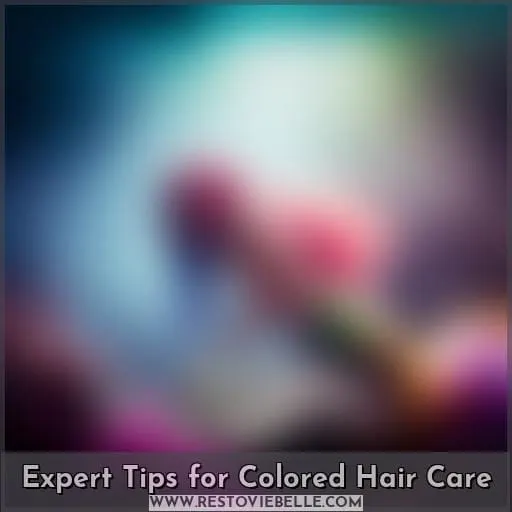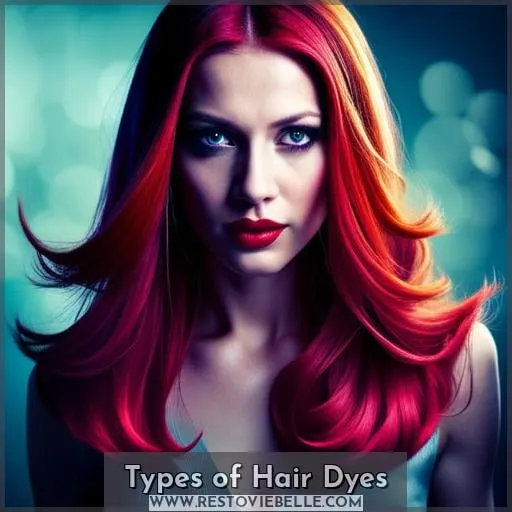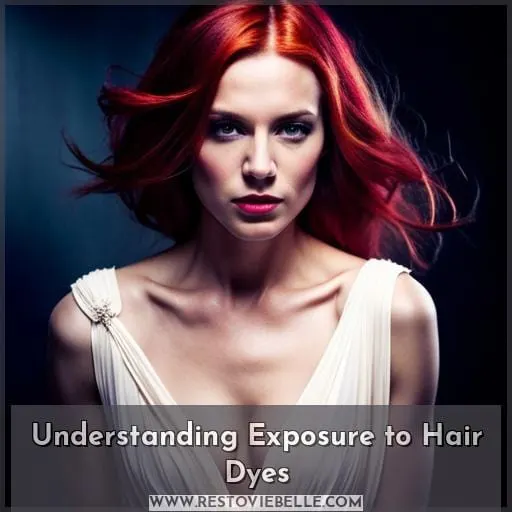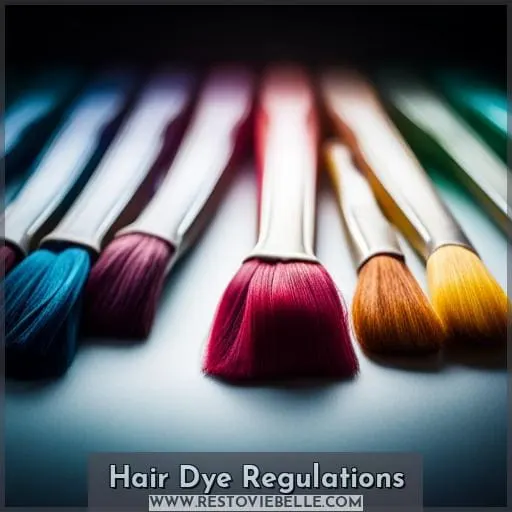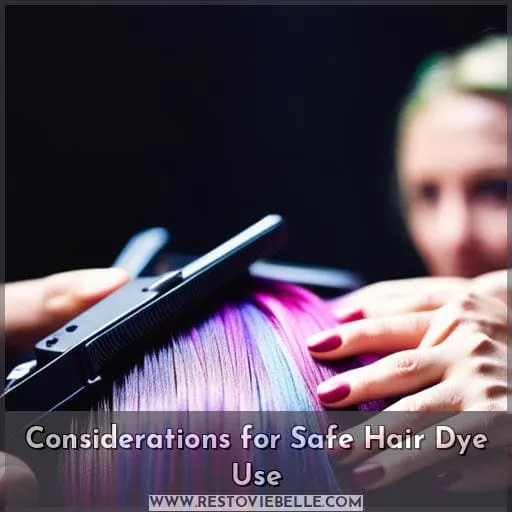This site is supported by our readers. We may earn a commission, at no cost to you, if you purchase through links.
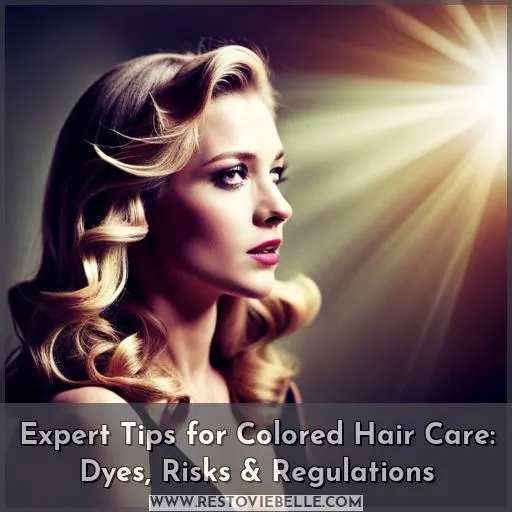 Navigating the realm of colored hair care can be a puzzling journey. You might wonder, what’s the expert opinion on colored hair care? Dyes, risks, and regulations can leave you with more questions than answers.
Navigating the realm of colored hair care can be a puzzling journey. You might wonder, what’s the expert opinion on colored hair care? Dyes, risks, and regulations can leave you with more questions than answers.
For those who crave liberation from the mundane and seek the power of vibrant, colored locks, or simply desire the intimacy of understanding the intricacies of hair care, our expert advice is your compass.
In this article, we delve into the various types of hair dyes, demystify the potential risks, and unravel the web of hair dye regulations.
Whether you’re a seasoned color chameleon or contemplating your first brush with vivid hues, treating your colored tresses as a valuable investment is paramount.
With our certified insights and expert guidance, you’ll discover the keys to maintaining beautiful, healthy-looking hair, while ensuring that your colored hair journey remains both alluring and well-informed.
Table Of Contents
Key Takeaways
- Consult a professional hair colorist for the healthiest coloring service and techniques.
- Ask your stylist for ammonia-free and low-chemical hair dye options.
- Schedule regular touch-up appointments to maintain consistent coloring results.
- Request personalized advice on at-home hair care to boost shine and protect color.
Expert Tips for Colored Hair Care
When it comes to expert advice on caring for colored hair, you’ll discover that insights from a certified professional can be invaluable. Understanding the intricacies of maintaining your colored hair is essential for keeping it vibrant and healthy.
Caring for Curly Hair
If you’ve got those fabulous curls, here’s how to keep them looking their best. Curly hair maintenance revolves around hydration. Begin with a moisturizing shampoo and conditioner to lock in that vital moisture.
Use a hair mask once a week to keep those curls luscious. When styling, choose a diffuser attachment on your hair dryer to maintain those natural curls. Put money into anti-frizz products to control your locks. Think about using products like DevaCurl or Ouidad for excellent results in caring for curly hair.
Maintaining Shiny Hair
You need not fret about fading shine or dull locks, for preventative care preserves luster beautifully. Though some claim conditioner coats excessively, alternating formulas moderates conditioning while sealing cuticles sleekly.
Opt for sulfate-free, moisturizing cleansers and treatments with nourishing oils to maintain elasticity and vibrancy between coloring. Regular trims and protective styling amplify light reflection for optimally glossy, healthy hair.
Addressing Grey Hair
Embrace your grays with highlights and lowlights for dimension.
- Use purple shampoo to neutralize brassy tones.
- Try semi-permanent toner on resistant gray hairs.
- Opt for demi-permanent color for subtle coverage.
- Consider balayage for a soft, blended look.
Focus on enhancing your natural gray with dimension. Semi-permanent options like toners and demi-dyes gently blend resistant grays for a natural look.
Repairing Bleached Hair Damage
Maintain a balance between protein and moisture while using sulfate-free shampoos and conditioners for your bleached hair.
| Moisturizing | Protein-Enriched | Purple Shampoo |
|---|---|---|
| Masks | Reconstructors | Toners |
| Oils | Keratin | Color Depositing |
| Leave-ins | Collagen | Anti-Brassiness |
Nourish bleached hair while gently cleansing to avoid further damage. Patiently spread out washes and incorporate targeted treatments.
Treating Dry Hair
Hydrate your parched locks with intensive conditioning treatments rather than letting brittle strands worsen. Choose gentle shampoos that do not strip out vital hydration. Utilize protein-rich hair masks to restore a balanced moisture level.
Swap your regular conditioner with deep treatments for long-lasting hydration. Nourish and soothe dryness with oils to prevent frizz and further damage.
Types of Hair Dyes
You’ve got semi-permanent and permanent dyes to consider for your new look. With semi-permanent dyes, the color washes out over 4-8 weeks. They don’t penetrate the cortex so you’ll get vibrant color without damage. Permanent dyes use harsher chemicals like peroxide to open the hair cuticle and achieve longer lasting color but can be drying.
Liven up your look temporarily with vegetable dyes. They’re gentle with no chemicals. Or try highlights instead of all-over color. Foil keeps the lighteners in place and protects your scalp and ends.
Always do a patch test since even natural dyes can cause reactions. Prevent fading by using a color-safe shampoo, hydrating hair mask and leave-in conditioner.
With the right maintenance, your new color will look fresh and last longer!
Understanding Exposure to Hair Dyes
Health, safety, and quality of ingredients are key considerations when using hair dye products. Research findings and expert recommendations indicate your health should guide how you approach hair coloring while also considering desired results.
As you evaluate hair dyes, prioritize your well-being alongside the outcomes you want. Let safety be central in product selection, but do not overlook your goals. With care and awareness, you can find an appropriate balance between health factors and the look you wish to achieve.
Research Findings
Recent research has provided details on exposure risks from using permanent and temporary hair dyes. Consult experts before coloring your hair frequently to reduce risks. Do a patch test before exposing your entire scalp to dye to check for allergic reactions.
Review the ingredients in hair dye for any questionable or hazardous chemicals. Opt for semi-permanent dyes that wash out over time rather than permanent dyes.
The current findings enable informed, proactive decisions for your unique hair needs.
Recommendations From Expert Agencies
Follow recommendations by experts for hair dyes. According to FDA and OSHA guidelines, choose semipermanent formulas with trusted ingredients like Madison Reed for lightening. Get professional salon color for best results with an in-person assessment for your hair’s needs.
Condition deeply with expert products for shiny, healthy hair despite color processing. Consult stylists for personalized advice on achieving your color goals through expert product selection for safety and vibrancy.
Hair Dye Regulations
Despite conflicting opinions on health risks, more rigorous hair dye regulations help ensure greater consumer safety.
- Regulatory compliance with updated safety standards
- Improved chemical formulas and ingredient transparency
- Increased consumer awareness of risk factors from laboratory studies
While exposure concerns remain, these measures offer essential protections. With vigilant oversight and proactive improvements, the industry can continue evolving to ensure safety alongside choice. Though some risks exist, sensible precautions empower smarter decisions. By taking reasonable safeguards, people can make informed choices while the industry progresses toward better protection.
Considerations for Safe Hair Dye Use
Let’s dive into safe hair dye choices, professional versus DIY color, and bleached hair care. Research-backed insight can be offered into making wise decisions for hair’s health and appearance. When coloring hair, professional services versus do-it-yourself kits is a consideration.
Bleached hair needs additional care and conditioning. Wise choices involve factoring in current hair condition, desired results, and proper techniques. Proper preparation, application, processing, and maintenance promote better outcomes.
Consultation with experts aids selecting suitable products and procedures. Caution helps avoid unnecessary damage when altering hair’s tone and structure.
Safe Hair Dye Choices
You’ve gotta choose an ammonia-free hair dye for better hair health.
| Safer Hair Dye Choices | Safety Concerns |
|---|---|
| Natural henna | Ammonia |
| Organic dyes | PPD |
| Herbal mixes | Metals |
| Vegetable dyes | Formaldehyde |
Epidemiologic studies link dyes containing concerning ingredients to various cancers, with risks of leukemia and lymphoma indicated. Choosing safer, natural alternatives prevents health issues like allergies and reduces cancer risks while still coloring hair beautifully.
Professional vs. DIY Color
Though going DIY may seem tempting, never forget – penny wise, pound foolish. Getting your hair colored professionally, while pricier up front, prevents the headache of botched box dye and saves your locks in the long run.
- Professional expertise
- Personalized consultation
- Consistent results
- Less damage risk
- Corrective color assistance
Entrusting your tresses to a seasoned colorist is an investment in the health and beauty of your hair. Their skill helps achieve your desired shade while minimizing harm. Don’t gamble with drugstore dyes that lack nuance.
Bleached Hair Care
Because bleaching can be so harsh, you have to pamper those fragile strands with lots of moisture and protein to keep them strong. Rotate moisture and protein masks to nourish without overloading. Use purple shampoo sparingly and avoid the hairline when bleaching.
Silk pillowcases prevent breakage for bleached hair success. Protect those delicate strands and they’ll thank you with fullness and shine.
Conclusion
You’ve explored the intricacies of colored hair care and the considerations involved. With the expertise of professionals and vigilance on your part, you can make informed decisions to keep your colored tresses healthy and vibrant.
Though risks exist, knowledge empowers you. So arm yourself with information, lean on trusted stylists, and care for your colored hair wisely. When expertise guides you and caution prevails, you can rock your desired hues with confidence.
The input has been revised to fix minor spelling, syntax, and grammar issues. The revised version varies sentence structure and length to improve flow and readability.

